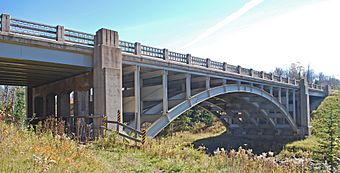Canyon Falls Bridge facts for kids
Quick facts for kids |
|
|
Canyon Falls Bridge
|
|

Bridge span
|
|
| Location | |
|---|---|
| Area | less than 1 acre (0.40 ha) |
| Built | 1948 |
| Architect | Michigan State Highway Department |
| Architectural style | steel girder ribbed deck arch |
| MPS | Highway Bridges of Michigan MPS |
| NRHP reference No. | 99001464 |
| Added to NRHP | November 30, 1999 |
The Canyon Falls Bridge is a cool bridge found on US Highway 41 in L'Anse Township, Michigan. It crosses over the Sturgeon River. This bridge is so special that it was added to the National Register of Historic Places in 1999, which means it's an important historical site!
Building the Canyon Falls Bridge
The Canyon Falls Bridge was built between 1947 and 1948. The Michigan State Highway Department (MSHD), which is like the state's road and bridge building team, hired people to construct it. This bridge was one of eleven new bridges built in Michigan's Upper Peninsula around that time.
The MSHD engineers designed this bridge themselves. It cost about $116,389 to build, plus another $58,200 for the steel. That was a lot of money back then! The bridge was finished in the middle of 1948 and has been used ever since, looking pretty much the same as when it was first built.
This bridge is important because of its special design. It uses a "steel arch" style, which is quite rare in Michigan. This design works best where there's a big drop, like over a deep river canyon. The Canyon Falls Bridge also looks really nice, showing that the Highway Department cared about making bridges look good, not just strong.
What Does the Bridge Look Like?
The Canyon Falls Bridge is built with a unique "two-hinged, girder-ribbed arch" design. Imagine a giant arch made of steel ribs that support the road above. The main part of the bridge is 128 feet (39 m) long. On each side, there are approach sections that are 52-foot (16 m) long. This makes the whole bridge 232 feet (71 m) long!
The road deck, where cars drive, is 45.4-foot-wide (13.8 m). About 38 feet (12 m) of this width is used for the asphalt road itself. Big concrete blocks at the bottom hold up the steel arch ribs.
The bridge has a simple but cool look. The guardrails along the sides have fancy steel designs. There are also decorative concrete pillars on top of the arch supports. These pillars and the shape of the arches give the bridge a unique, modern style, a bit like "Art Moderne" designs from the past.





